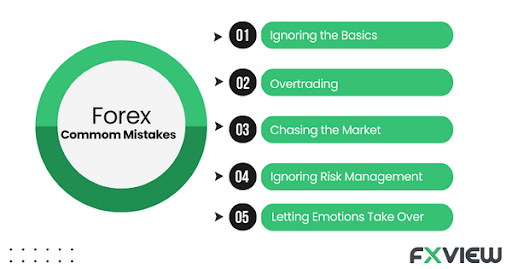
5 Common Mistakes in Forex Trading to learn from
Welcome to the thrilling world of forex trading, where the daily turnover exceeds a staggering 7.5 trillion dollars! This dynamic environment, brimming with opportunities and risks, is like a roller coaster, demanding skill, patience, and clarity of thought. The forex market, not for the faint-hearted, presents a sophisticated challenge where even minor missteps, or common mistakes in forex trading, can lead to significant losses. Let’s dive into these pitfalls and learn how to navigate them smoothly.

Mistake #1: Ignoring the Basics
Overview:
A frequent common mistake in forex trading is overlooking the essentials. Many traders, eager to engage in the market, fail to grasp the fundamental concepts of forex, similar to running without tying shoelaces – a direct path to stumbling.
In-depth Analysis:
- Understanding Forex Pairs: A common mistake in forex trading is not recognizing the nuances between major, minor, and exotic pairs, along with their associated volatility.
- Leverage and Margins: Misinterpreting leverage is another common mistake in forex trading, often leading to oversized positions and significant losses.
- Economic Indicators: Key indicators like GDP, interest rates, and employment figures are crucial, yet often overlooked, elements in forex trading.
Practical Tips to consider:
- To avoid these common mistakes in forex trading, regularly review educational resources.
- Stay updated on global economic news.
- You may consider utilizing a demo account to reinforce your understanding of forex basics.
Mistake #2: Overtrading
Overview:
Overtrading, a common mistake in forex trading, often results from the intoxicating thrill of the market, leading to reduced decision-making quality and higher transaction costs.
In-depth Analysis:
- Recognizing Overtrading Signs: Trading frequently without strategy or to recover losses quickly are classic signs of this common mistake in forex trading.
- Balance and Discipline: Effective trading requires a delicate balance between seizing opportunities and maintaining discipline.
Practical Tips to consider:
- Smart investors can set clear trading goals and limits to avoid this common mistake in forex trading.
- Develop a solid trading plan and adhere to it.
- Take regular breaks to prevent burnout and maintain perspective.
Mistake #3: Chasing the Market
Overview:
Attempting to predict market movements, a common mistake in forex trading, often leads to rushed and ill-advised decisions.
In-depth Analysis:
- Market Volatility: Understanding the inherent volatility and unpredictability of forex markets is crucial.
- Strategic Approach: Rather than chasing the market, you may consider concentrating on strategies that match your risk tolerance.
Practical Tips to take into consideration:
- You may consider using stop-loss orders to effectively manage risks and avoid this common mistake in forex trading.
- Steer clear of impulsive trades based on sudden market movements.
- Continuously evaluate and adjust your strategy.
Mistake #4: Ignoring Risk Management
Overview:
Neglecting risk management is a pervasive common mistake in forex trading, potentially leading to substantial losses.
In-depth Analysis:
- Understanding Risk-Reward Ratio: Another common mistake in forex trading is not balancing potential gains against losses.
- Diversification: Failing to diversify is a frequent oversight in forex trading.
Practical Tips to consider:
- You may consider setting stop-loss and take-profit levels to avoid these common mistakes in forex trading.
- Regularly revisit and adjust your risk management strategies.
- Controlling your emotions is an important element to prevent risky decisions.
Mistake #5: Letting Emotions Take Over
Overview:
Emotional trading, a typical common mistake in forex trading, can cloud judgement and lead to irrational decisions.
In-depth Analysis:
- Emotional Triggers: Identifying personal triggers is crucial in avoiding this common mistake in forex trading.
- Emotional Discipline: Cultivating a mindset of detachment is essential.
Practical Tips you may take into consideration:
- Develop routines to foster a calm and focused mindset.
- Maintain a trading journal to track emotional responses and decisions.
- Practice mindfulness or other stress-reduction techniques.
Key Takeaways for avoiding common mistakes in forex trading
- Grasping key forex concepts, pairs, leverage, and economic indicators is crucial to avoid common mistakes in forex trading.
- Recognize and resist the urge to overtrade; maintain discipline and a solid trading plan.
- Understand market volatility and focus on suitable strategies, avoiding the common mistake of chasing the market in forex trading.
- Balance potential gains against losses. You may consider diversifying trades and using stop-loss and take-profit orders to navigate common mistakes in forex trading.
- Identify emotional triggers and maintain objectivity, utilizing techniques to manage emotions and avoid common mistakes in forex trading.
- Continuously learn and improve, recognizing that forex trading is a journey filled with opportunities to learn from these common mistakes.
Conclusion
Forex trading is an ongoing learning journey, filled with challenges and opportunities. By staying vigilant and mindful of these common mistakes in forex trading, you can enhance your experience and level up your trading approach. Remember, the path to becoming a mindful trader isn’t about achieving perfection, but about learning from mistakes and continuously improving. Here’s to your journey in the dynamic world of forex trading.
Disclaimer: The information in this article is provided for educational and informational purposes only and is not intended to be, nor does it constitute financial, investment or trading advice. You should not make any financial, investment or trading decision based on the information provided in this article without performing your own research or seeking advice from an independent advisor.



